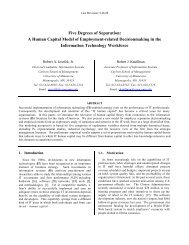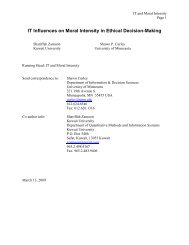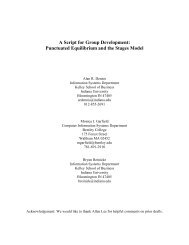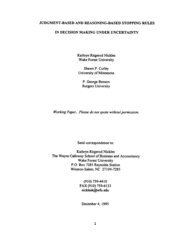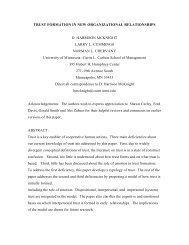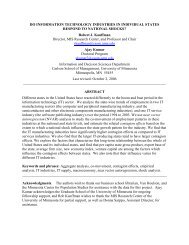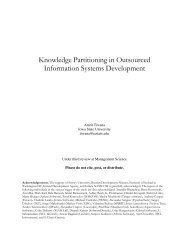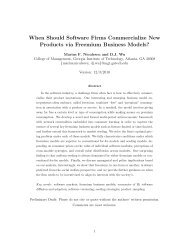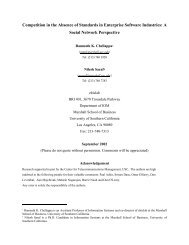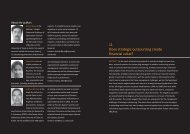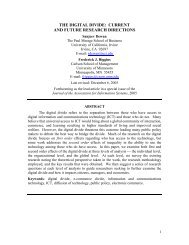Agent-Based Modeling to Inform Online Community Theory and ...
Agent-Based Modeling to Inform Online Community Theory and ...
Agent-Based Modeling to Inform Online Community Theory and ...
You also want an ePaper? Increase the reach of your titles
YUMPU automatically turns print PDFs into web optimized ePapers that Google loves.
Posts <strong>and</strong> logins are observable behaviors. To better underst<strong>and</strong> the route by which moderation af-<br />
fects posting <strong>and</strong> login behaviors, we examined their impact on two benefits – benefit from access-<br />
ing information (informational benefit) <strong>and</strong> benefit from interpersonal bonds (relational benefit).<br />
Doing so illustrates an important design trade-off involved in choosing among moderation tech-<br />
niques.<br />
3.3.1. Member benefit in communities with different <strong>to</strong>pical breadth 5 . Figure 8 shows the<br />
effects of moderation <strong>and</strong> <strong>to</strong>pical breadth on the amount of informational <strong>and</strong> relational benefit that<br />
agents received, averaged across all active members <strong>and</strong> the five snapshots at which benefits were<br />
recorded.<br />
<strong>Agent</strong>s received greater informational benefit in the <strong>to</strong>pically broad communities than the<br />
<strong>to</strong>pically narrow ones (p < .001), <strong>and</strong> with either type of moderation than with no moderation (p<br />
< .001). The interaction between moderation <strong>and</strong> <strong>to</strong>pical breadth indicates community-level mod-<br />
eration <strong>and</strong> personalized moderation led <strong>to</strong> higher informational benefits under different conditions<br />
(p < .001). <strong>Community</strong>-level moderation led <strong>to</strong> twice as much informational benefit compared <strong>to</strong><br />
personalized or no moderation in communities with a narrow focus, whereas personalized modera-<br />
tion led <strong>to</strong> 10-15% more benefit compared <strong>to</strong> community-level or no moderation in communities<br />
with a broad focus.<br />
In contrast, agents received greater relational benefit in the <strong>to</strong>pically narrow communities<br />
than in the <strong>to</strong>pically broad communities (p < .001). Both personalized moderation <strong>and</strong> no modera-<br />
tion led <strong>to</strong> greater relational benefit than did community-level moderation (p < .001). Compared <strong>to</strong><br />
community-level moderation, personalized moderation led <strong>to</strong> twice as much relational benefit, <strong>and</strong><br />
no moderation led <strong>to</strong> approximately 75% more relational benefit. The effects of moderation on re-<br />
lational benefit also depended on different <strong>to</strong>pical breadth (p < .001). Personalized moderation led<br />
5 Because previous analyses revealed no significant difference between medium <strong>and</strong> broad <strong>to</strong>pical breadth <strong>and</strong> a<br />
linear effect of message volume, we omitted medium <strong>to</strong>pical breadth in Figure 8 <strong>and</strong> medium message volume in<br />
Figure 9 <strong>to</strong> make the figures more readable.<br />
24



